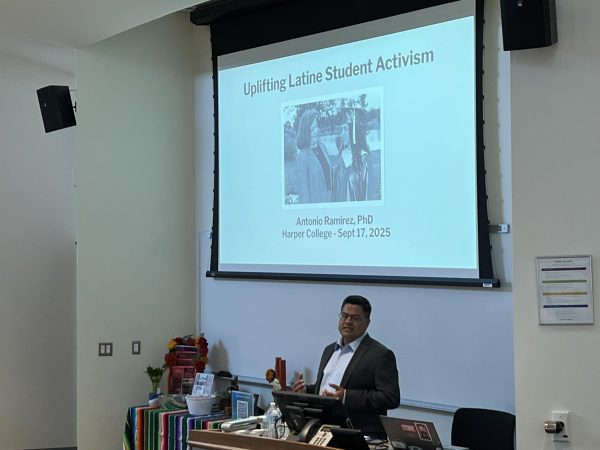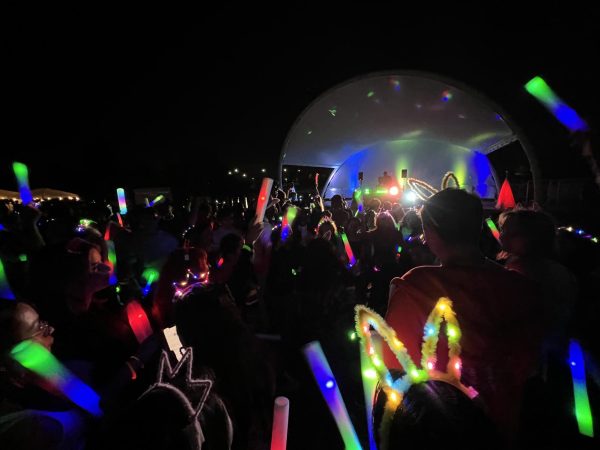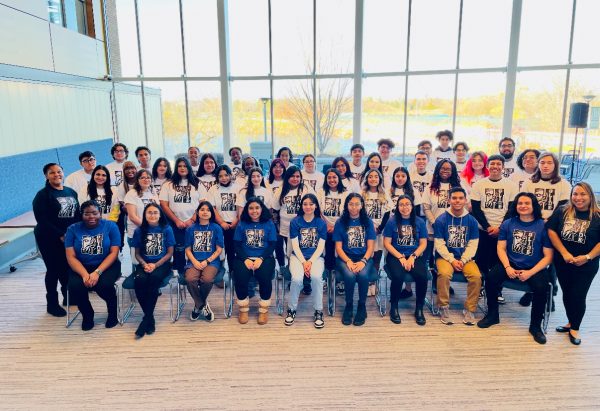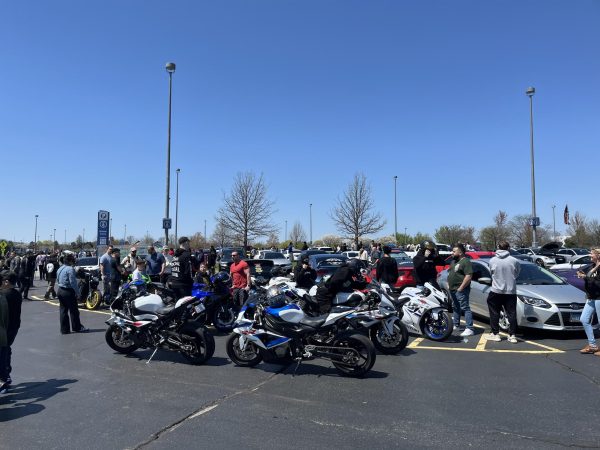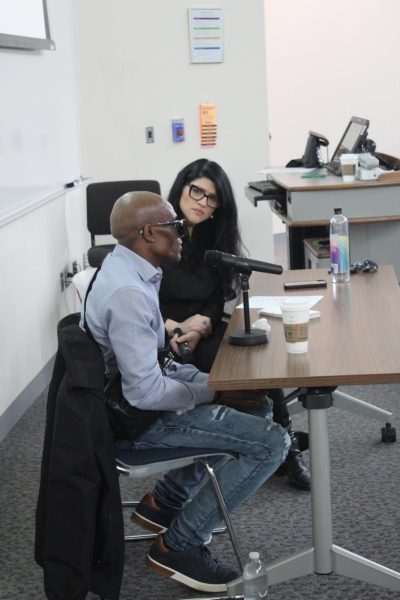Video: Harper students react to the war in Ukraine
During her spring break this year, 19-year-old Harper student Maja Keska traveled to Poland to aid Ukrainian refugees displaced by the Russian invasion of their homeland.
She traveled to the town of Przemysl and began to work at the registration desk of a local school that had become a sanctuary for those fleeing to Poland from the war, which had begun in February on the orders of Russian president Vladimir Putin. It was Keska’s job to help sign in new arrivals.
While half of the school’s campus had been repurposed to serve as an asylum for these refugees, the other half still operated as a place of learning.
“It was really overwhelming to see all these people with no homes, no direction really. The people went to a country where they didn’t really know how to speak the language,” Keska said. ”It was heartbreaking and tragic to witness that.”
Keska directly interacted with a number of Ukrainian refugees during her stay in Poland. Many she spoke to had faced several traumatic experiences by the time they had arrived at safety.
“This old man came up to me, and he was telling me that he left Ukraine. His mother, his wife, and his daughter had all lost contact with him and he was trying to find them,” Keska said. “All we could do was register him.”
Keska said the refugees would often recount stories of strife and hardship. Each story they told left a profound impact upon her.
“It really changed my life. I think about the refugees, the people I met there, and the people who put their lives on hold,” Keska said. ”It was a very psychologically draining experience, but it changed my life.”
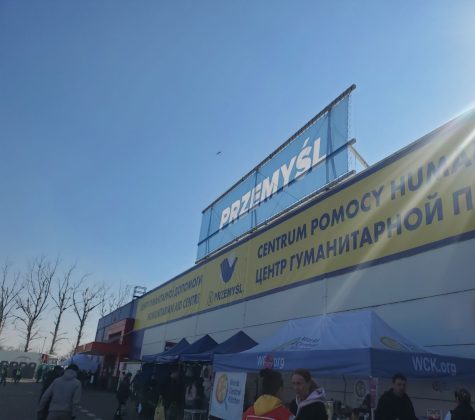
The war has resulted in thousands of casualties, and has affected the lives of many Ukrainian citizens along with their family members living abroad since it first began, including those at Harper.
Several Ukrainian students have responded to this significant event, such as Anastasia Havryliuk, a freshman at Harper currently studying for a degree in computer science.
“It makes me live by the news. I’m not living to experience things as much,” Havryliuk said. ”I’m living to make sure I know my family stays safe and my country stays safe.”
Havryliuk added that the conflict has had a negative impact on her well being and opinion towards the Russian government.
Ukrainian freshman Yulia Hutsul, who is studying for her associates in liberal arts, expressed how the war has affected her perception of everyday life.
“It really shifted my view of what’s important and what’s not. I’m definitely more family oriented right now,” Hutsul said.
Illya Daniv, a 19-year-old sophomore at Harper, has family in Ukraine and voiced anxiety about the situation they are faced with.
“It’s been pretty hard worrying about their safety… One missile strike, and they’re six feet under,” Daniv explained.
Daniv also went into detail about the effect the war has had on his direct family in the United States, stating that “[his] mother works with sending packages to Eastern Europe, so it’s been affecting business too.”
Students aren’t the only Ukrainians at Harper affected by the conflict either.
Natasha Ruiz is a professor of humanities at the college whose family immigrated to the United States from Lviv. Though she doesn’t have any family in Ukraine currently, Ruiz has kept in contact with friends there, and still feels an attachment to the country.
The professor explained that her correspondents mentioned seeing “things like missiles and other artillery” in their front yards, and have voiced gratitude towards the sympathy from the world at large.
“I feel kind of helpless, so it’s really a humbling experience to hear them say, ‘Thank you,’ and that the United States is so wonderful for helping us,” Ruiz said of her contacts in Ukraine.
Despite the conflict being thousands of miles across the sea, there are still reasons for non-Ukrainian citizens in the United States to be mindful of what’s happening.
“Russia believes it has the right to go in and tell Ukraine what kind of system and government that they want them to have, and from the U.S. perspective, that’s not the kind of world we want to develop,” explained Bobby Summers, a professor of political science at Harper. “We want to have a world that’s based upon rules, that’s based upon the consent of the people that are governed, and a world that is based upon some basic fundamental rights.”
Summers also went into detail about the world’s dependence on Russian oil and gas, resulting in the rising gas prices that any student who owns a car has no doubt noticed.
During this time of crisis for Ukrainian students and staff, there are several ways in which they believe their peers can help.
“I think spreading awareness on social media or talking to someone who’s Ukrainian. Be honest about the talk so you can find out more about the culture. Ask how you can help. Just saying you understand, how are you supposed to understand what we are going through?” Havryliuk said.
“It’s important to feel like there is someone who will listen to you,” Hutsul said. “I know the situation can be political, but it’s not necessarily about politics — it’s about feelings, it’s about families.”
“I think keep reaffirming support. Even making it vocal that you stand with Ukraine, it helps a lot. It helps us feel like we’re not alone,” Daniv said.
Ruiz proposed the idea of lectures being hosted on campus about “the history of Ukraine and other countries in and around that area that aren’t protected by NATO.”
“Whether they be on some kind of social media platform or what have you, get that message out there, share with average Russians what’s going on… and hopefully they’ll start holding their governments accountable,” Summers suggested.
Harper has started to provide resources for students personally affected by the crisis as well. Counseling for students has become a more available option, according to Hutsul, and a subcommittee of the Student Activities Board (SAB) has formed with the express purpose of providing comfort and support to Ukrainian students affected by the conflict.
The subcommittee has also set up a student-led initiative called, Hawks For Hope: Crisis in Ukraine, collecting funds for Harper to make a collective donation to Project Hope’s Crisis in Ukraine Campaign. Booths collecting cash donations can be found in buildings D and L until March 21, and students may also donate digitally, if they prefer.
According to student engagement coordinator Melanie Duchaj, the subcommittee has so far been able to raise over $1,500 for the campaign, with the goal being $10,000.
Meetings for the subcommittee take place every Tuesday from 2:00-2:30 PM in meeting room W216 following SAB meetings, and are open to any students wishing to participate.


